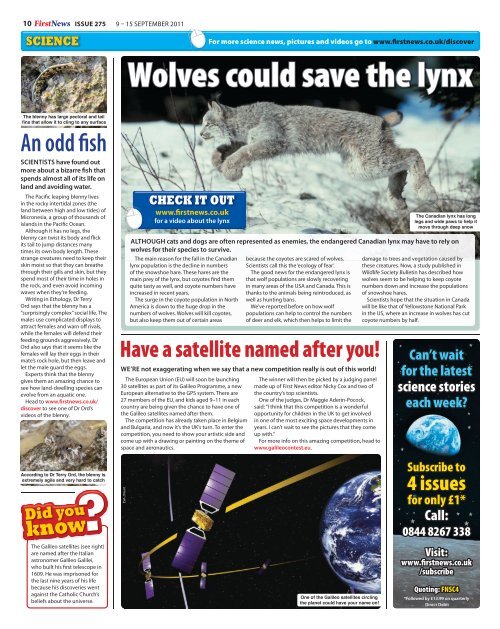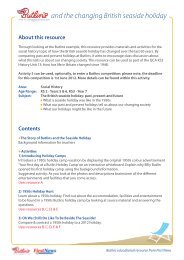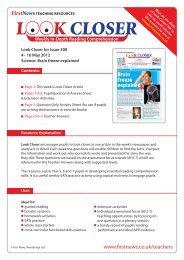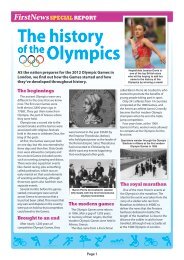You also want an ePaper? Increase the reach of your titles
YUMPU automatically turns print PDFs into web optimized ePapers that Google loves.
10 <strong>FirstNews</strong> <strong>ISSUE</strong> <strong>275</strong> 9 – 15 SEPTEMBER 2011SCIENCEFor more science news, pictures and videos go to www.firstnews.co.uk/discoverGina Cooke, UNSWWolves could save the lynxThe blenny has large pectoral and tailfins that allow it to cling to any surfaceAn odd fishSCIENTISTS have found outmore about a bizarre fish thatspends almost all of its life onland and avoiding water.The Pacific leaping blenny livesin the rocky intertidal zones (theland between high and low tides) ofMicronesia, a group of thousands ofislands in the Pacific Ocean.Although it has no legs, theblenny can twist its body and flickits tail to jump distances manytimes its own body length. Thesestrange creatures need to keep theirskin moist so that they can breathethrough their gills and skin, but theyspend most of their time in holes inthe rock, and even avoid incomingwaves when they’re feeding.Writing in Ethology, Dr TerryOrd says that the blenny has a“surprisingly complex” social life. Themales use complicated displays toattract females and warn off rivals,while the females will defend theirfeeding grounds aggressively. DrOrd also says that it seems like thefemales will lay their eggs in theirmate’s rock hole, but then leave andlet the male guard the eggs.Experts think that the blennygives them an amazing chance tosee how land-dwelling species canevolve from an aquatic one.Head to www.firstnews.co.uk/discover to see one of Dr Ord’svideos of the blenny.Courtney Morgans, UNSWAccording to Dr Terry Ord, the blenny isextremely agile and very hard to catchknow?Did youCHECK IT OUTwww.firstnews.co.ukfor a video about the lynxALTHOUGH cats and dogs are often represented as enemies, the endangered Canadian lynx may have to rely onwolves for their species to survive.The main reason for the fall in the Canadianlynx population is the decline in numbersof the snowshoe hare. These hares are themain prey of the lynx, but coyotes find themquite tasty as well, and coyote numbers haveincreased in recent years.The surge in the coyote population in NorthAmerica is down to the huge drop in thenumbers of wolves. Wolves will kill coyotes,but also keep them out of certain areasbecause the coyotes are scared of wolves.Scientists call this the ‘ecology of fear’.The good news for the endangered lynx isthat wolf populations are slowly recoveringin many areas of the USA and Canada. This isthanks to the animals being reintroduced, aswell as hunting bans.We’ve reported before on how wolfpopulations can help to control the numbersof deer and elk, which then helps to limit theHave a satellite named after you!WE’RE not exaggerating when we say that a new competition really is out of this world!The European Union (EU) will soon be launching30 satellites as part of its Galileo Programme, a newEuropean alternative to the GPS system. There are27 members of the EU, and kids aged 9–11 in eachcountry are being given the chance to have one ofthe Galileo satellites named after them.The competition has already taken place in Belgiumand Bulgaria, and now it’s the UK’s turn. To enter thecompetition, you need to show your artistic side andcome up with a drawing or painting on the theme ofspace and aeronautics.ESA-J.HuartThe winner will then be picked by a judging panelmade up of First News editor Nicky Cox and two ofthe country’s top scientists.One of the judges, Dr Maggie Aderin-Pocock,said: “I think that this competition is a wonderfulopportunity for children in the UK to get involvedin one of the most exciting space developments inyears. I can’t wait to see the pictures that they comeup with.”For more info on this amazing competition, head towww.galileocontest.eu.damage to trees and vegetation caused bythese creatures. Now, a study published inWildlife Society Bulletin has described howwolves seem to be helping to keep coyotenumbers down and increase the populationsof snowshoe hares.Scientists hope that the situation in Canadawill be like that of Yellowstone National Parkin the US, where an increase in wolves has cutcoyote numbers by half.GettyThe Canadian lynx has longlegs and wide paws to help itmove through deep snowCan’t waitfor the latestscience storieseach week?Subscribe to4 issuesfor only £1*Call:0844 8267 338The Galileo satellites (see right)are named after the Italianastronomer Galileo Galilei,who built his first telescope in1609. He was imprisoned forthe last nine years of his lifebecause his discoveries wentagainst the Catholic Church’sbeliefs about the universe.One of the Galileo satellites circlingthe planet could have your name on!Visit:www.firstnews.co.uk/subscribeQuoting: FNSC4*Followed by £13.99 on quarterlyDirect Debit
















